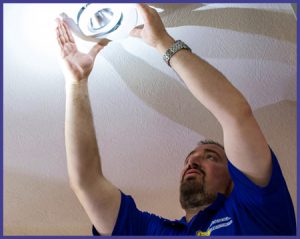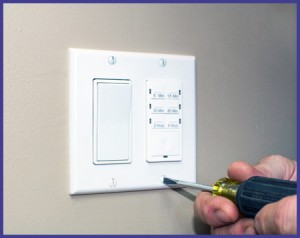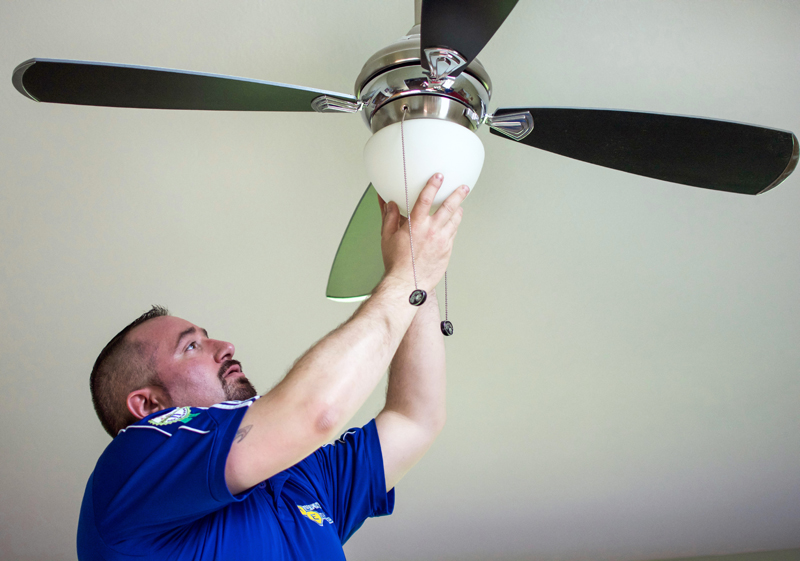 Motion sensor lights are nothing new, and many of us have a porch or garage light that comes on when anyone walks near the door. Why don’t more people bring that technology indoors? Think of all the times your kids have forgotten to turn off the bathroom or bedroom light. And if you have very young children who get up at night, or you tend to wake up during the night yourself, a motion light can provide immediate, hands-free lighting in a hallway so you can see where you are going. These motion activated light switches are also a smart choice for closets or storage areas, both spaces we tend to visit briefly before closing the door and forgetting to turn off the light. Contact us for more information about installing motion sensor switches in your home.
Motion sensor lights are nothing new, and many of us have a porch or garage light that comes on when anyone walks near the door. Why don’t more people bring that technology indoors? Think of all the times your kids have forgotten to turn off the bathroom or bedroom light. And if you have very young children who get up at night, or you tend to wake up during the night yourself, a motion light can provide immediate, hands-free lighting in a hallway so you can see where you are going. These motion activated light switches are also a smart choice for closets or storage areas, both spaces we tend to visit briefly before closing the door and forgetting to turn off the light. Contact us for more information about installing motion sensor switches in your home.
Category Archives: Tips
Do It Yourself Electrical Projects
Small Projects You Can Do Safely

The majority of homeowners refrain from do-it-yourself electrical repairs and upgrades, and for the most part, this is the right decision. However, there are a few simple projects that homeowners with the right tools, knowledge, and verification of local codes can absolutely tackle on their own. And if you are not confident trying them on your own, a licensed professional electrician will happily take care of it for you.
Turn Off the Power
Before you tackle any project, there is one thing you absolutely must do in order to ensure a safely completed project. SHUT OFF THE ELECTRICITY! If you are working on an appliance that can be unplugged, unplug it! If you are working on something that is wired into your house, like light switches or outlets, shut off the breaker! And if you aren’t sure you have shut off the right breaker, turn off the main power. After you are sure you have shut off the power to your project, check it again. The pride you feel in completing a project will be more than slightly dimmed if you find yourself in the hospital because you got electrocuted in the process.
Switching Switch Plates
The first and possibly simplest project you can undertake is changing out your switch plates and outlet covers. It may seem like a small thing, but changing the plain white covers with something more decorative and appropriate to your design style can make a huge change in your living area. And all this job requires is the new hardware and a screwdriver.
While you have the old switch plate removed, you can consider changing your switch itself. Maybe the switch has gone bad, or you want a new style of switch, or perhaps you want to install a dimmer. Determine what type of switch you are trying to replace. Single-pole switches control one light fixture from one switch location. Three-way switches control a single fixture from two switch locations, for example your basement light which can be controlled from the top of the stairs or right inside the door from the garage. Dimmer switches are available in each of these types of switch. Talk to the experts at a hardware store to make sure you have purchased the correct switches.
Changing Outlets
Changing the outlets is similar to changing a light switch. Again, you will need to make sure you have the correct type of outlet. Ungrounded outlets (with only two holes) are found most frequently in older houses. Grounded outlets are the three-holed outlets that we are most used to seeing. Ground-fault circuit interrupters (more commonly referred to as GFCI outlets) have a built in fault mechanism that detect electrical imbalance and are more typically found in moist areas like bathrooms, kitchens, and garages and workshops. It is important to remember, though, that if you need to upgrade your outlets from an ungrounded outlet to a grounded one, this becomes a more complicated project and it is recommended that you to call an electrician.
Light Fixtures and Ceiling Fans
Some more advanced projects that can be done yourself with the proper knowledge are changing existing light fixtures and installing ceiling fans. The challenge with these is to make sure that your fixtures are installed with a properly rated electrical junction box in the ceiling and the right hardware to keep the fixture safely on the ceiling and not falling on the people under it. If you are at all unsure about your skills at this project, the safest solution would be to call a licensed electrician.
Since there is one piece of advice that can’t be emphasized enough, it is again important to say SHUT OFF THE ELECTRICITY before you take on any of these projects. Good luck and be safe.
Summertime Electrical Safety Tips
Stay Safe During Summer Fun
Summertime is practically upon us. Most of our kids (and teachers) are counting down the days until school is out and three months of freedom begin. We spend out summer enjoying ourselves, indulging in outdoor activities like picnics and swimming. It is important to remember, though, that as we move our fun outdoors we have to be aware of the dangers summertime outdoor electricity can pose to us and our children. Check out these tips that can ensure that you have a fun, safe, and happy summer!
Remember that Electricity and Water Don’t Mix…Ever
Who doesn’t daydream about sitting in a lounge chair by the pool with a cool drink and some even cooler tunes? Your feet are up, your sunglasses are on, your friends and loved ones are splashing in the pool and, for that matter, splashing everything within a 10-foot perimeter of the pool deck! When you take your mini fridge outside to keep your sodas cool and not have to go all the way back into the kitchen for another, make sure that you have it plugged in far enough from any water sources (pool, sprinkler, hot tub) that the electrical connection can’t get wet. The same goes for bringing your radio outside for the tunes, or your blender for some cool frozen drinks. Not only should all of your outdoor outlets have Ground Fault Circuit Interrupters (GFCI), they must be weather-resistant GFCI receptacles. These receptacles are marked with a “WR”. Remember not to touch any outdoor appliances while you, yourself, are wet. No quicker way to dampen the spirits (pun intended) of your backyard party than an electrical accident. You have better things to do with your summer than ride in an ambulance!
Stay Away From Power Lines
Whether they are up on a pole, connected to your house, or lying on the ground, power lines are NOT your friend. Always assume that any and all power lines are live and dangerous. Don’t touch a power line…PERIOD. Don’t touch it with any part of your body, don’t touch it with a stick or a toy, don’t throw your tied-together shoes up there, DON’T TOUCH IT. Fly your kite in a wide open field away from power lines. Don’t climb trees that are too close to power lines. And while we are talking about climbing, don’t climb power poles or towers either. Why risk spending your glorious summer months in the hospital with serious electrical burns when you could simply…say it with me now…stay away from power lines.
Get Grounded
Using a Ground Fault Circuit Interrupter can help prevent electrocutions and electrical shock injuries. Portable GFCIs are easy to install and require no tools. And they can be purchased at very reasonable prices ranging from $12 to $30. Electrical devices like GFCIs, electrical receptacles, switches, plugs, and outlets can be damaged if they get wet. It is important to replace any of these if they become very wet or submerged. Protect them by using outlet covers near outdoor water sources. According to the National Electric Code (NEC), all exterior receptacles must be enclosed with a heavy duty “in-use cover”. And while you’re at it, protect your home by making sure all of your indoor appliances are plugged into grounded outlets and not extension cords. And make sure you have GFCI outlets in all of your wet areas inside your home. Your bathroom, kitchen, basement, even your garage, can be very vulnerable to moisture in the outlets. Make sure you have a safe and secure home to retreat into when the heat outside gets to be too much. Ground it! Any electrical devices and appliances that will be near water sources, “you’re grounded!”
In the event that an electrical emergency does happen, know where your circuit breakers are, and know how to quickly and safely turn them off. If you have any questions about how to keep your family safe and happy during the fun summertime months, please call a certified electrician like the ones at Hufnagel Electric for sound expert advice. And above all, have a great summer!
How to Save Electricity in the Summer
 Well it looks like spring might finally have arrived here in Pittsburgh! As the temperature rises, we make the switch from heating to cooling our homes, and we become acutely aware that along with the temperature, our electricity bills are rising too. Here are some tips to help you save electricity and still keep cool in the summer.
Well it looks like spring might finally have arrived here in Pittsburgh! As the temperature rises, we make the switch from heating to cooling our homes, and we become acutely aware that along with the temperature, our electricity bills are rising too. Here are some tips to help you save electricity and still keep cool in the summer.
Take care of your air conditioner.
Cleaning your air conditioner’s filter in the summer is just as important as changing the furnace filter in the winter. When the filters are dirty, the air conditioning has to work harder to cool your home, raising your electricity usage. If you have whole-house air conditioning, it can be as easy as hosing off the unit outside and making sure it is in good condition with straight fan blades and a smoothly running motor.
If you have an older home with a room that you just can’t keep cool, you might be tempted to simply lower the whole-house temperature, but that is counteractive to your effort to save electricity. Consider buying a small window unit for that room. You will save energy by simply turning it on when you are using the room, and off again when you leave.
Pay attention to your lights.
It has been said that almost 25 percent of your monthly electricity comes from the lights in your home. Making sure the lights are off in unoccupied rooms can help to save electricity. Changing your light bulbs from standard incandescent bulbs to compact fluorescent lighting (CFLs) or light-emitting diodes (LEDs) in your light fixtures will also help. CFLs or LEDs use 75 percent less energy than incandescent bulbs and last up to 10 times longer.
Explore other cooling options.
There are countless option for cooling your home that can help reduce your energy usage and therefore your electric bill. As tempting as it is to open the curtains and let the summer sunshine into the room, those rays of sun are radiating heat into your room. Keeping the curtains closed unless you are right there indulging in the sunlight can help to keep a room cool.
Another option is ceiling fans. Ceiling fans, used in conjunction with your air conditioning can actually help to save electricity and money. Using the fan only when you are in the room to feel the effects, can allow you to raise the temperature on the air conditioner and consequently save money. As the ceiling fan doesn’t actually cool the air but circulates it causing you to feel cooler, turn it off when you are not in the room so that you aren’t wasting electricity.
You might also consider investing in a whole-house fan. A whole-house fan is most effective when used in the evening, overnight, and in the morning when the outside temperature tends to drop lower than the indoor temperature. It mounts between the living space and the attic and draws the cool fresh air through open windows into your living area. The then pulls the old stuffy hot air up into the attic and forces it out through your attic vents. A whole-house fan, used properly, has the potential to even eliminate the need for air conditioning.
Install a programmable thermostat.
Programmable thermostats can be purchased at a local hardware store for as little as $30 and are easily installed. Once you have it working, simply program it to raise or lower the air conditioning during the times when you use it most. Reducing air conditioning usage when you aren’t home to enjoy it, can go a long way towards reducing your electricity costs in the summer.
Contact Hufnagel Electric with any questions regarding electrical upgrades and changes to your home for the summer. And now that the beautiful weather is here, and you have prepared your home and your wallet for summer electric bills, get out there and enjoy it!
Winter Electrical Safety Tips
During the cold months of winter you may not think about the dangers of house fires, but they do exist. Most house fires are caused by electrical issues in your home. It is important to follow a few safety tips to keep you and your family safe this winter. Continue reading

